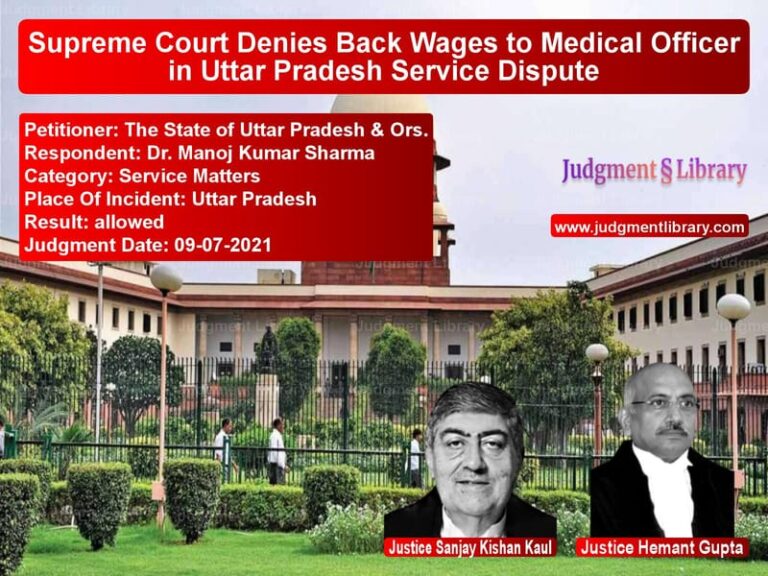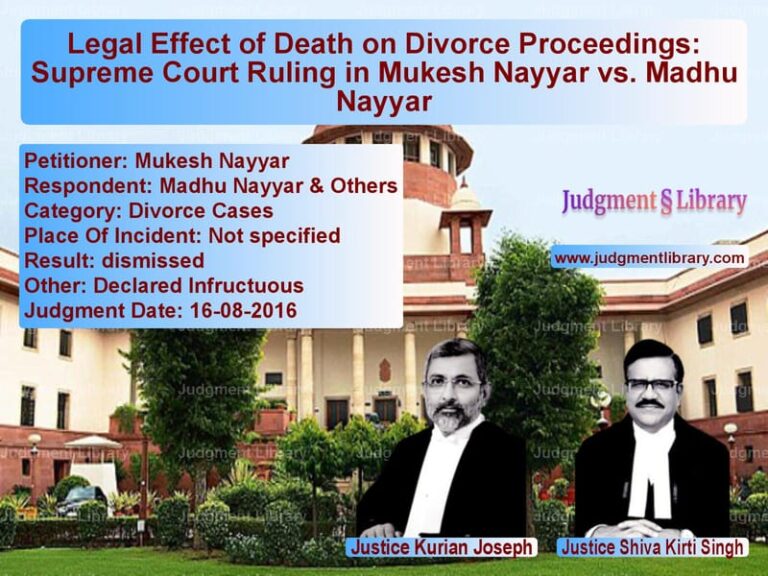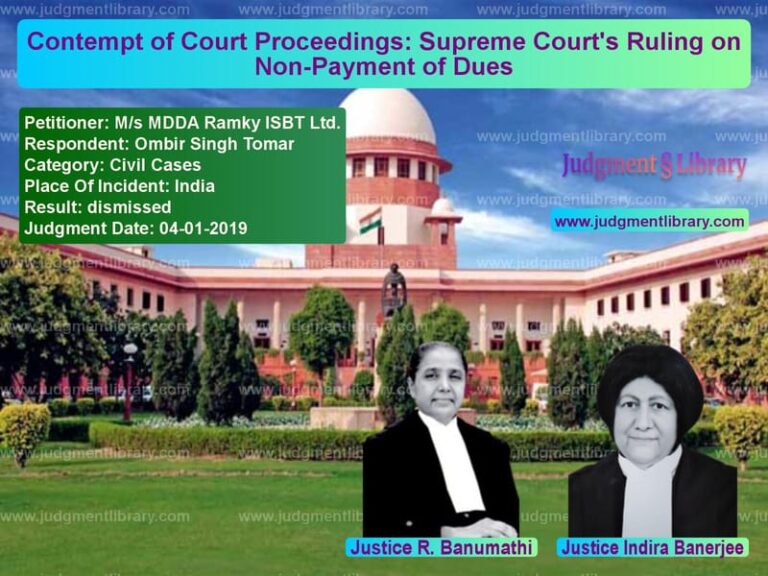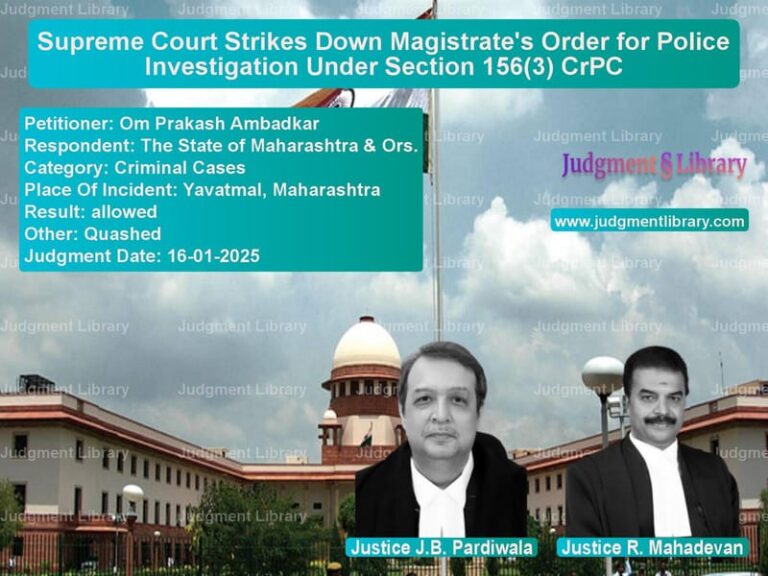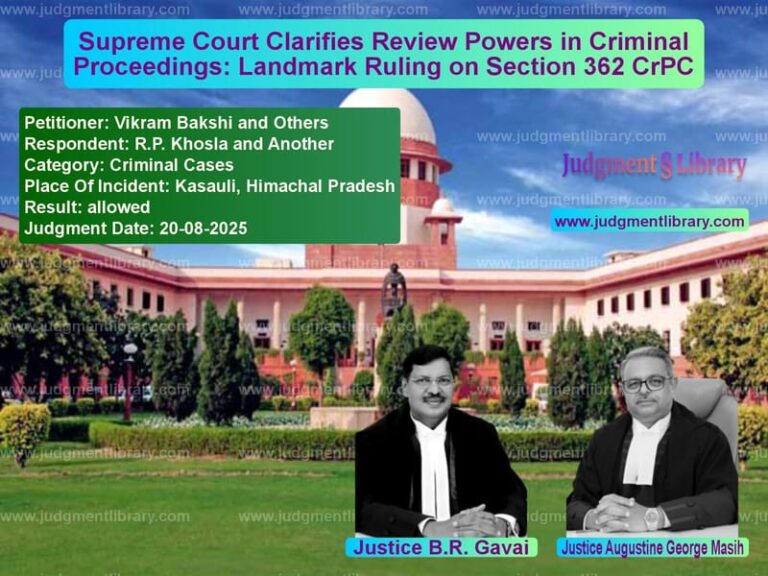Supreme Court Overturns High Court Order in Eldeco Housing’s Suit for Specific Performance
The Supreme Court of India recently ruled on a significant civil dispute in the case of Eldeco Housing and Industries Limited v. Ashok Vidyarthi & Ors.. The case primarily involved a property dispute where the appellant sought specific performance of a Memorandum of Understanding (MoU) for the sale of property. The judgment clarified the scope of Order VII Rule 11(d) of the Civil Procedure Code (CPC), which deals with the rejection of plaints when a suit appears to be barred by law.
Background of the Case
The case arose from a Memorandum of Understanding (MoU) executed on August 31, 1998, between Eldeco Housing (appellant) and Ashok Vidyarthi (respondent no.1), for the purchase of property in Kanpur. The MoU stated that the sale would take place once the litigation among the family members of respondent no.1 was resolved.
However, when the appellant learned that the respondent was attempting to sell the property to third parties, it initially filed a suit for an injunction in 2009, which was later dismissed. When the litigation among the family members was finally resolved in 2015, the appellant sought to enforce the MoU by filing a suit for specific performance in 2017.
Respondent’s Objection and Lower Court’s Rulings
Respondent no.1 contested the suit for specific performance, arguing:
- The suit was barred by Order II Rule 2 CPC, which prevents a party from filing a subsequent suit on the same cause of action when relief could have been claimed in an earlier suit.
- The appellant had earlier filed an injunction suit in 2009 but did not seek specific performance at that time, which barred the current suit.
- The MoU did not specify a fixed sale price, making it unenforceable.
Respondent no.1 filed an application under Order VII Rule 11(d) CPC seeking the rejection of the plaint. The Trial Court rejected this application, and the High Court of Allahabad also upheld the Trial Court’s decision. However, on review, the High Court reversed its ruling and dismissed the suit, holding that it was indeed barred under Order II Rule 2 CPC.
Issues Before the Supreme Court
The Supreme Court had to determine:
- Whether the High Court erred in allowing the review application.
- Whether the suit for specific performance was barred by Order II Rule 2 CPC.
- Whether the rejection of the plaint under Order VII Rule 11(d) CPC was justified.
Appellant’s Arguments
The appellant, Eldeco Housing, argued that:
- The suit for specific performance was not barred because the cause of action for specific performance did not exist in 2009 when the injunction suit was filed, as the litigation among the respondent’s family had not been resolved.
- Order II Rule 2 CPC did not apply because the relief of specific performance was not available at the time of the earlier suit.
- The High Court committed an error in allowing a review petition on an issue already decided in a well-reasoned order.
- The application under Order VII Rule 11(d) CPC should have been dismissed since a suit cannot be rejected merely on a defense argument—it must be clear from the plaint itself that it is barred by law.
Respondent’s Arguments
The respondent, Ashok Vidyarthi, countered that:
- The appellant had already sought an injunction in 2009 and should have included a prayer for specific performance in that suit.
- The 1998 MoU was vague, as it did not specify a sale price or fixed time frame for execution.
- The appellant had also issued a notice in 2001 seeking a refund of earnest money, which indicated that it had abandoned the agreement.
- The High Court correctly applied Order II Rule 2 CPC to dismiss the suit.
Supreme Court’s Analysis
1. Rejection of Plaint Under Order VII Rule 11(d) CPC
The Supreme Court reiterated that while considering an application under Order VII Rule 11 CPC, only the averments in the plaint and accompanying documents can be considered, not the defendant’s arguments or external evidence. The Court stated:
Read also: https://judgmentlibrary.com/supreme-court-allows-secondary-evidence-in-land-sale-agreement-dispute/
“The court at this stage would not consider any evidence or enter a disputed question of fact or law.”
The Court held that since the cause of action for specific performance arose only in 2015 when the family litigation concluded, the suit could not be rejected at the threshold.
2. Applicability of Order II Rule 2 CPC
The Supreme Court ruled that Order II Rule 2 CPC did not apply, stating:
“The suit for specific performance was filed when the right to seek such a relief crystallized, which was after the family litigation concluded in 2015.”
The Court further held that in the 2009 injunction suit, the appellant only sought to prevent the property from being sold but did not have the right to demand specific performance at that time.
3. High Court’s Error in Review Order
The Supreme Court found that the High Court had no valid grounds to review its previous decision. It observed:
“A review is not an appeal in disguise and cannot be used to reconsider issues that have already been decided.”
The Court held that the High Court’s reasoning in its original decision was sound and should not have been disturbed.
Final Judgment
Based on its findings, the Supreme Court:
- Set aside the High Court’s review order.
- Restored the order of the Trial Court rejecting the application under Order VII Rule 11(d) CPC.
- Directed the Trial Court to proceed with the suit for specific performance.
However, the Supreme Court clarified that the issue of whether the suit was ultimately maintainable could be decided as a preliminary issue after the pleadings were completed.
Conclusion
The ruling underscores the principle that:
- A plaint can only be rejected under Order VII Rule 11(d) CPC if it clearly discloses that the suit is barred by law, which was not the case here.
- A cause of action must be ripe before a party can claim specific performance—if it was not available earlier, Order II Rule 2 CPC does not bar a later suit.
- Review petitions cannot be used as a means to revisit a legally sound decision.
By reinstating the suit for specific performance, the Supreme Court ensured that the appellant would have an opportunity to present its case fully before the Trial Court.
Petitioner Name: Eldeco Housing and Industries Limited.Respondent Name: Ashok Vidyarthi & Ors..Judgment By: Justice Vikram Nath, Justice Rajesh Bindal.Place Of Incident: Kanpur, Uttar Pradesh.Judgment Date: 29-11-2023.
Don’t miss out on the full details! Download the complete judgment in PDF format below and gain valuable insights instantly!
Download Judgment: eldeco-housing-and-i-vs-ashok-vidyarthi-&-or-supreme-court-of-india-judgment-dated-29-11-2023.pdf
Directly Download Judgment: Directly download this Judgment
See all petitions in Contract Disputes
See all petitions in Property Disputes
See all petitions in Specific Performance
See all petitions in Landlord-Tenant Disputes
See all petitions in Damages and Compensation
See all petitions in Judgment by Vikram Nath
See all petitions in Judgment by Rajesh Bindal
See all petitions in allowed
See all petitions in Remanded
See all petitions in supreme court of India judgments November 2023
See all petitions in 2023 judgments
See all posts in Civil Cases Category
See all allowed petitions in Civil Cases Category
See all Dismissed petitions in Civil Cases Category
See all partially allowed petitions in Civil Cases Category


